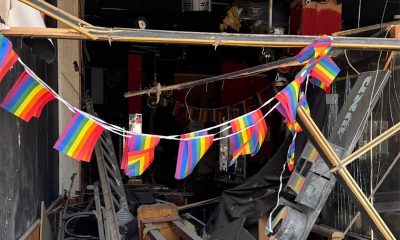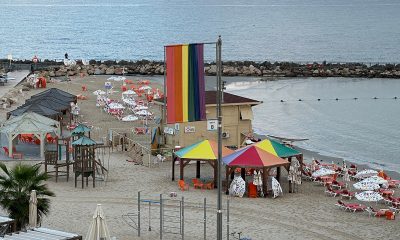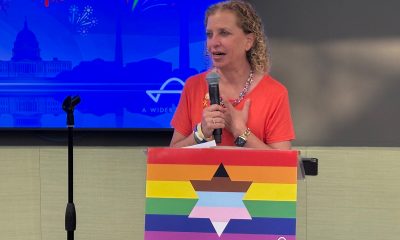Middle East
‘This wedding is both defiance and pride’
IDF reservist married partner in Ein Yahav on Nov. 22
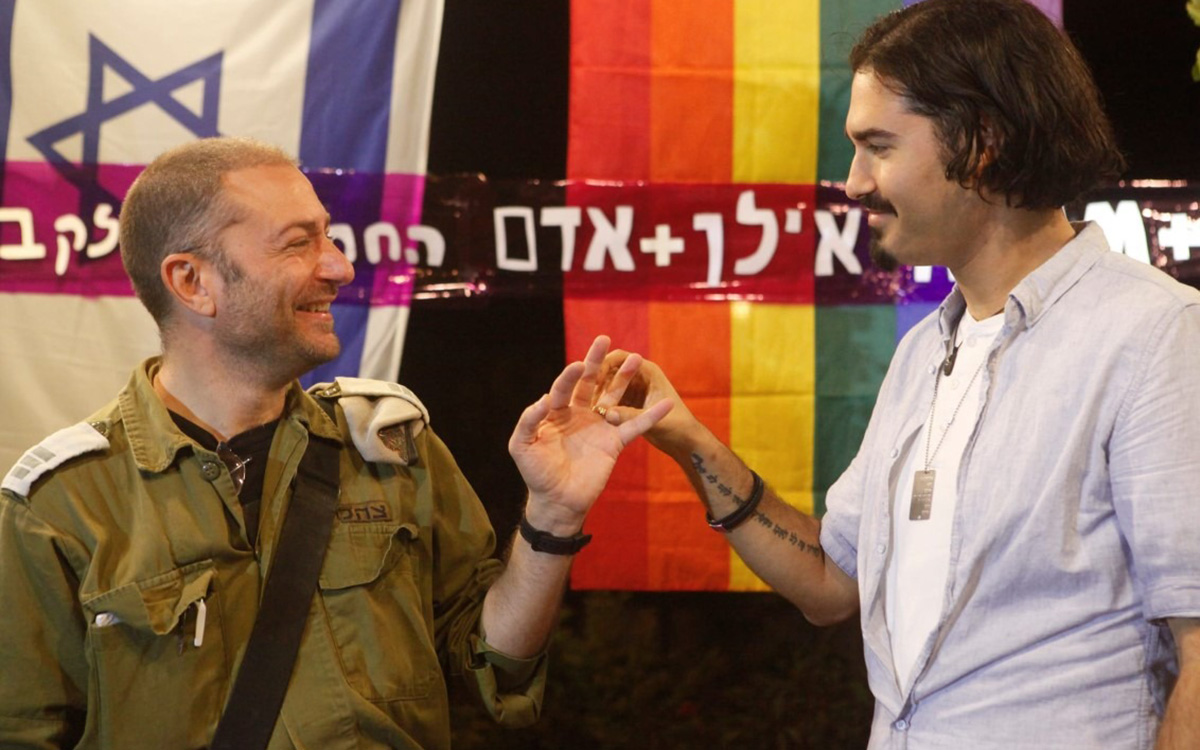
WDG is the Washington Blade’s media partner in Israel. This article ran on WDG’s website on Nov. 23.
Among dozens of reservists who became a family, with a spontaneous canopy at the B&B in Ein Yahav and refreshments donated with much love from Eilat businesses and residents, Adam Din and Ilan Cohen held their wedding ceremony Nov. 22.
“We did this wedding because it is important to us that the world knows that there is love even in the middle of the war and that we can celebrate love as well through it all,” said the couple.
Adam and Ilan’s wedding was scheduled to take place about two weeks ago on the beach between Ashdod and Nitzanim. The invitations were already prepared, but the terrible massacre on Oct. 7, and the war that broke out in its wake, postponed all their plans.
Ilan was immediately drafted into the reserves in the Gaza Division, leaving Adam alone at home. Nati Harosh, the couple’s best friend who was supposed to be the groomsman at the wedding, was also drafted into the reserves as a Givati Brigade fighter.
“We were supposed to get married on the beach,” says Adam, “The war postponed the wedding, and also took Nati.”
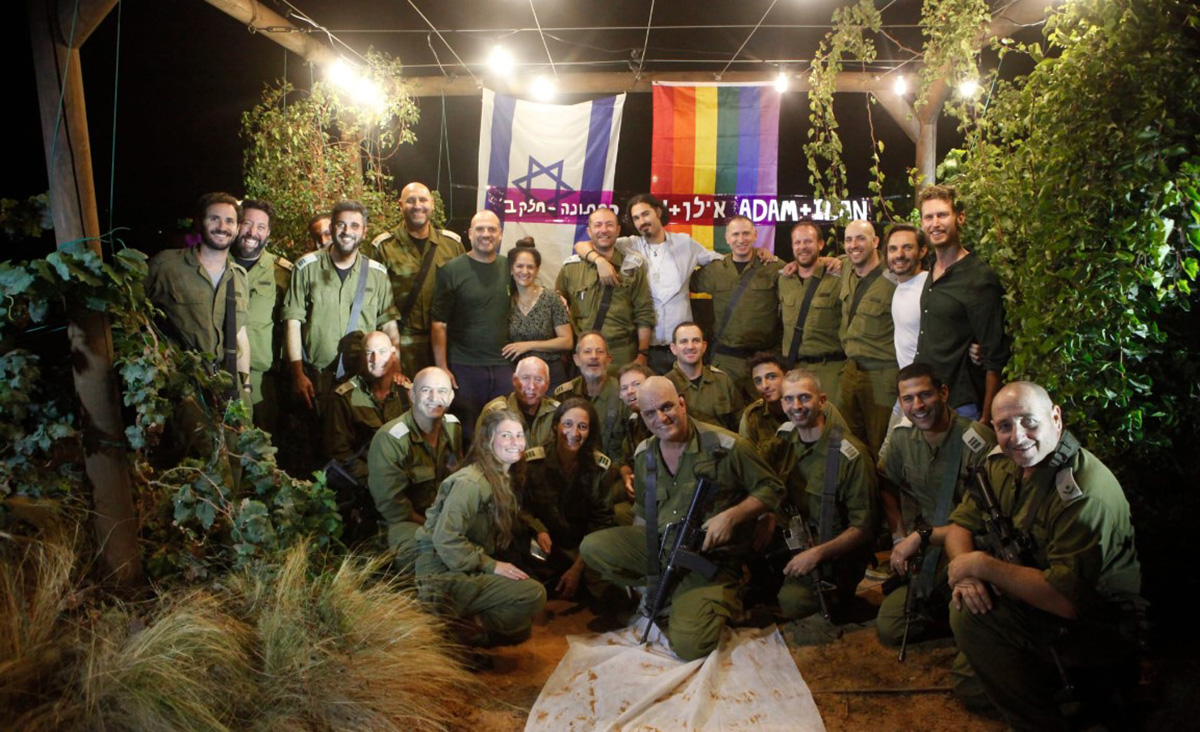
Adam and Ilan met a year and eight months ago.
“We met on Tinder, not for a serious purpose,” says Adam. “After we met, Ilan introduced me to a group of travelers from the gay community and we used to go on trips together. Over time we got to know each other more and more and in an organic and natural way we became together. It never had an official date.”
The short acquaintance was very significant for both of them.
“I was in the closet in front of the family before I met Ilan, and also childfree. And getting to know Ilan changed me completely,” says Adam. “I came out in front of my family and introduced them to Ilan, and I also decided that I wanted us to become parents together. My life changed thanks to him and we are really a family.”
The first friend Adam introduced to Ilan was Nati.
“Nati is a friend of mine from the time I lived in Jerusalem during my internship. We met through mutual friends and became very close friends. Nati was a giving person, like the meaning of his name Nathaniel. One of those people who were untouched by the cruelty of the world. Always ready to help. Doesn’t hold a grudge even when he is treated badly, and I would get angry for him and he wouldn’t get angry,” says Adam.
“Nati’s move from Jerusalem to Ramat Gan was one of the reasons that led us to move there as well, and since then we have been at each other’s house a lot on Shabbat,” he adds. “Nati came from a religious family, and he is liberal and open and loves every person regardless of who they are. And it was very clear and natural to me that he would be the one to accompany me on this significant occasion of mine. In the Utah wedding we held in Zoom, Nati was my witness, and we planned for him to be the groomsman in the wedding party.”
An April Fool’s prank that turned into a marriage proposal
Adam proposed to Ilan a few months ago.
“On April 1, we repeated one of our significant dates at the Saker Garden in Jerusalem,” says Adam, “Then Ilan knelt down as if he was going to propose to me and took out a Kinder egg. Kind of an April Fool’s prank. He thought it was funny. So I decided to get back at him and a few months later I also gave him a Kinder egg, only my Kinder egg had a ring in it.”
Three months ago, the two were married in a Utah wedding on Zoom in order to receive recognition as a couple who married abroad, with Nati accompanying them as a witness. They planned to hold the party itself at the beach between Ashdod and Nitzanim, at the exact place where Adam proposed to Ilan. About two months ago they returned to the place, found the perfect location for the wedding and we set a date.
But as mentioned, the events of Oct. 7 postponed the plans, and Ilan was drafted into the reserves.
“During his reserve service, Ilan saw horrible and terrible sights,” says Adam, “[It is] a horror that has no name, that gives him nightmares and scars his heart and soul. But when he comes home he comes to his shelter and his safe environment. Here he can get away for a moment from the horror outside. With the announcement of Nati’s death, the bereavement burst into our house, into our safe place.”
The two found out about Nati’s death through a news website.
One evening at the beginning of November, when Ilan was at home for a short break, a message about the death of a Givati Brigade soldier in Gaza popped up on his phone.
“He fell silent and went to the side,” Adam recalled. “His face went blank, the way it went blank when he remembered the terrible things he saw there. I asked him what he saw. He didn’t want to show me and started crying. I asked him again what happened and then he told me that Nati died. I didn’t believe him and then he showed me the news. I looked and couldn’t believe what I was reading. I saw Nati’s photo in the article and I said, ‘What idiots, they accidentally put a photo of Nati. What a mistake.'”
“I quickly called Nati to tell him to ask for the photo to be taken down so his family wouldn’t see it, but he didn’t answer,” he added. “Since then I send him WhatsApps all the time. Yesterday I sent him a selfie of us and wrote to him: Tomorrow I’m getting married, you’re invited.”
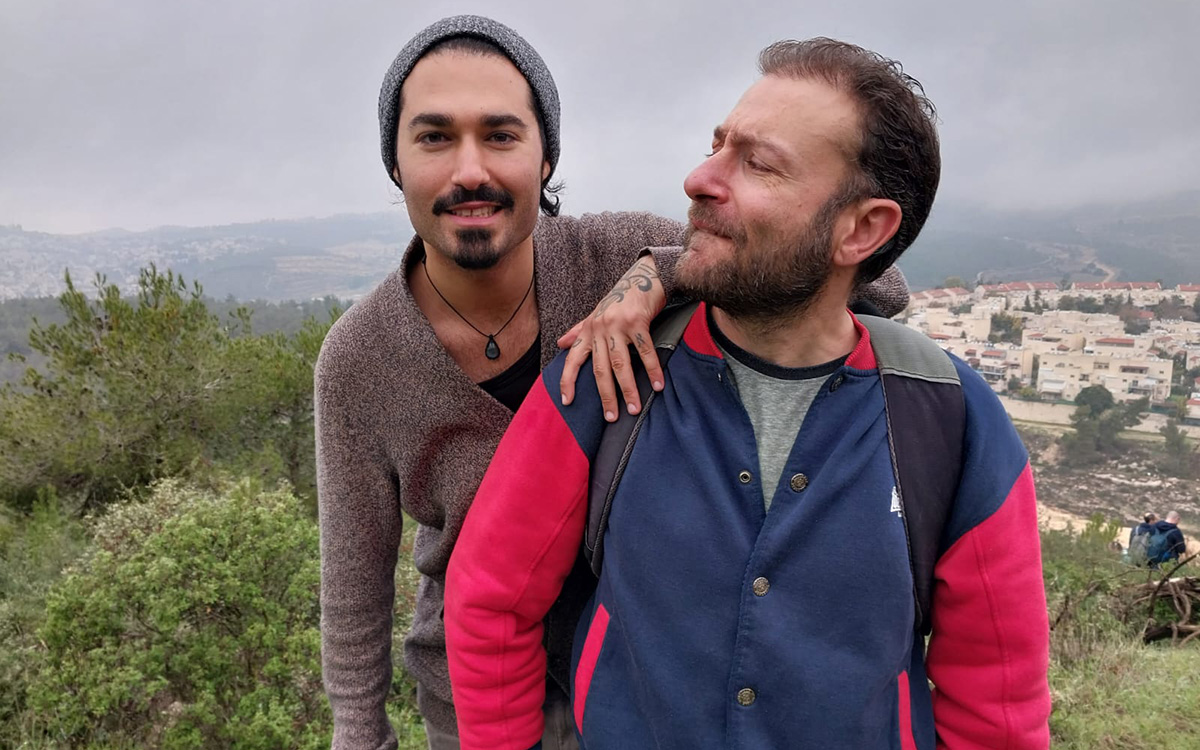
Many people will have to die for there to be equality
After Nati was killed, the two felt that the wedding was becoming more urgent. Ilan told the story of the wedding to his friends in the reserve battalion, and also told them about Nati, who was killed in the war.
“He told them that the wedding is now more urgent than ever, and that it is precisely now in this war that love should be celebrated, and his friends suggested that the wedding be held in the unit. Two days ago he came to me and asked: What are you doing on Wednesday? And I answered him that I was working. Then he asked me, do you want to get married? I told him yes and asked him if he was coming back from the reserves, and he told me: No. We will do it in the battalion.”
WDG: Did you felt complete with the choice?
ADAM: Ilan and his colleagues have been together for over a month. When I talk to him I hear them, and I hear him talking about them, they really became family. So although the wedding is spontaneous without my friends and family being able to come, it is being held with his family, who are actually the army and the friends from the reserves. And Nati will be there in spirit too. He died among soldiers, so we will feel his love among other soldiers who will be happy with us”
WDG: How does it feel to have a “military wedding”?
ADAM: This is not the wedding I expected, but I always told Ilan that I would marry him even inside a volcano. Everywhere. At the same time, this wedding has a lot of mixed emotions. This period is full of sadness and disappointment. The LGBTQ community is an equal partner in the national effort and the war, and its men and women do not receive equal status when they return home.
We could get married like everyone else but we have to do it in a crooked way with Zoom, and in no way, LGBTQ people are literally dead to protect us but no one counts them.
Ilan has been in service for a month and a half, and yet he had to find crooked ways to get married, feeling that he is worth less than other people, who don’t even join the army.
So for me this wedding is both defiance and pride. And this is the ambivalence. We feel a part and we sacrifice the most precious, and yet we don’t deserve to be married like everyone else and we are in a less good position. And yet we continue and get married in the middle of the war.”
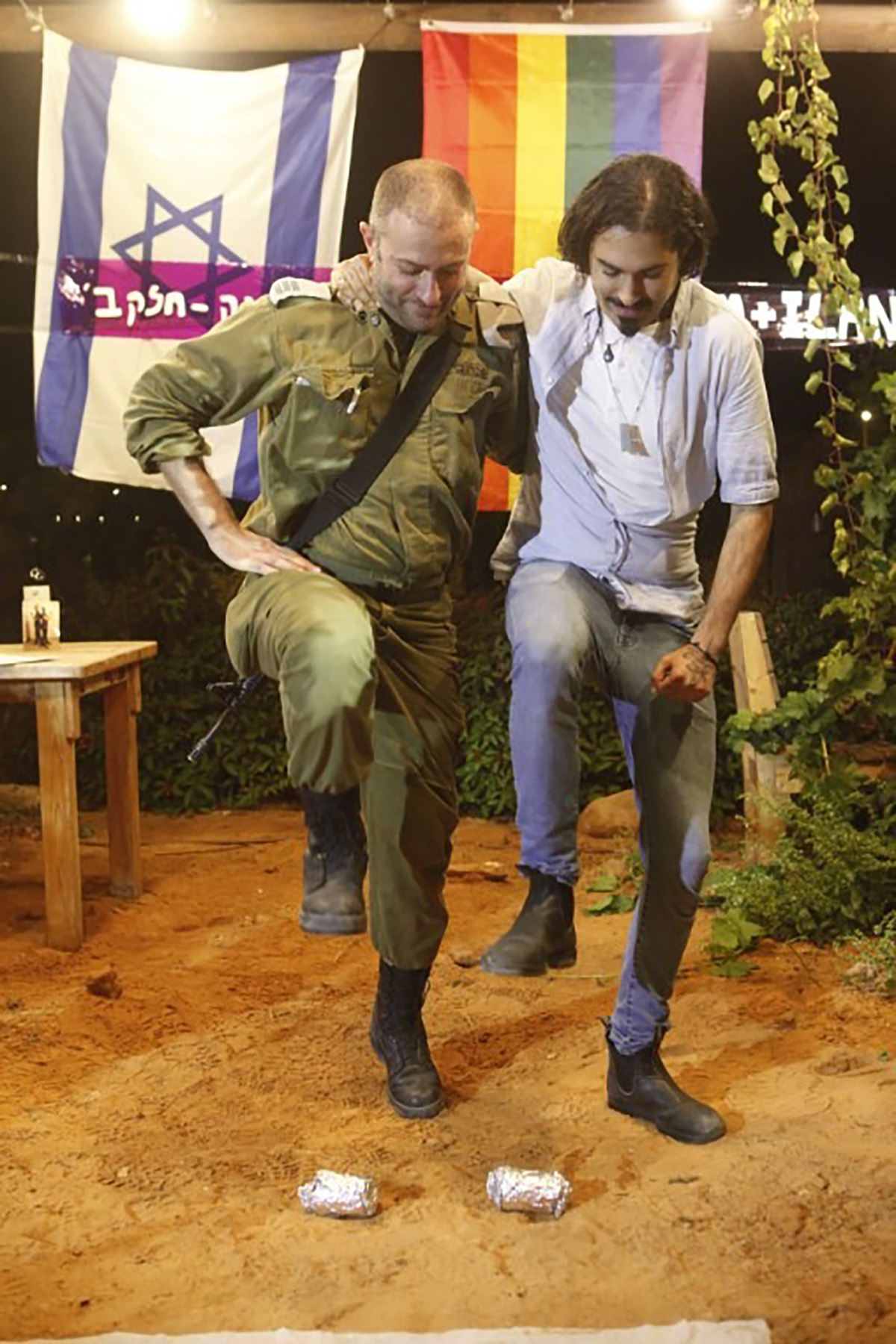
WDG: Do you think that following this period, which highlights the gap between what we give to the state and what we receive, a change will come?
ADAM: For Sagi Golan’s law, Sagi had to die. Part of his mate is dead too, I guess. I do believe that we will have equal rights, I believe that many people will have to die for it.
WDG: What is it like to live when your partner is so far from home for such a long period of time?
ADAM: Since that terrible Saturday when he was called I have been sleeping on the sofa. I can’t sleep in bed without him. There are long periods when he is without reception on the phone and I am constantly refreshing the pages of the news sites, to see if anything has happened. And when he returns home afterwards there is a tremendous feeling of momentary relief and an opportunity to be together for a bit. Even though as a volunteer in the LGBTQ help line, even when he goes out to retire from the reserves, he takes a shift and volunteers remotely.”
The couple and WDG would like to thank WILLOW – Zimmer in Arava, for volunteering to host the ceremony.
Israel
Iranian missile destroys Tel Aviv’s last gay bar
Mash Central is a few blocks from US Embassy
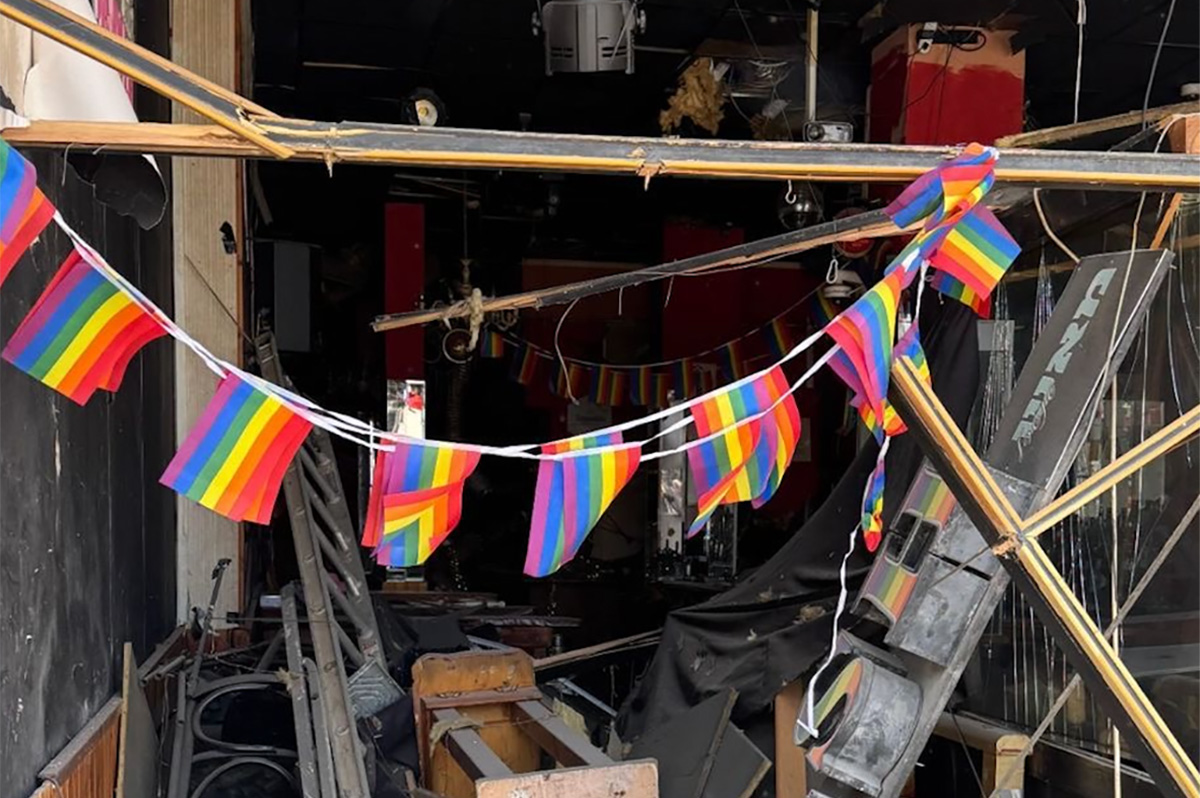
An Iranian missile on June 16 destroyed a gay bar in Tel Aviv, Israel.
The missile struck Mash Central, which is a few blocks from the U.S. Embassy on Allenby Street, and surrounding buildings. Israeli sources confirmed to the Washington Blade that Mash Central was the only gay-specific bar in Tel Aviv.
“Iran’s missile strike yesterday destroyed Tel Aviv’s only dedicated gay bar,” reads one Instagram post with pictures from inside the bar. “This place provided a safe space for minorities to express themselves — now it’s trashed.”
Mash Central describes itself as Tel Aviv’s “last gay bar standing,” even though the city promotes itself as one of the world’s most LGBTQ-friendly cities.
Israel on June 13 launched airstrikes against Iran that targeted the country’s nuclear and military facilities. Iran since the war began has launched hundreds of missiles towards Israel.
Tel Aviv’s Pride parade was scheduled to take place on June 13, but authorities cancelled it. Caitlyn Jenner, who was to have been the event’s guest of honor, is among those who were stranded in Israel after the war began.
Israel
Tel Aviv Pride parade cancelled after Israel attacks Iran
Caitlyn Jenner was to have been guest of honor
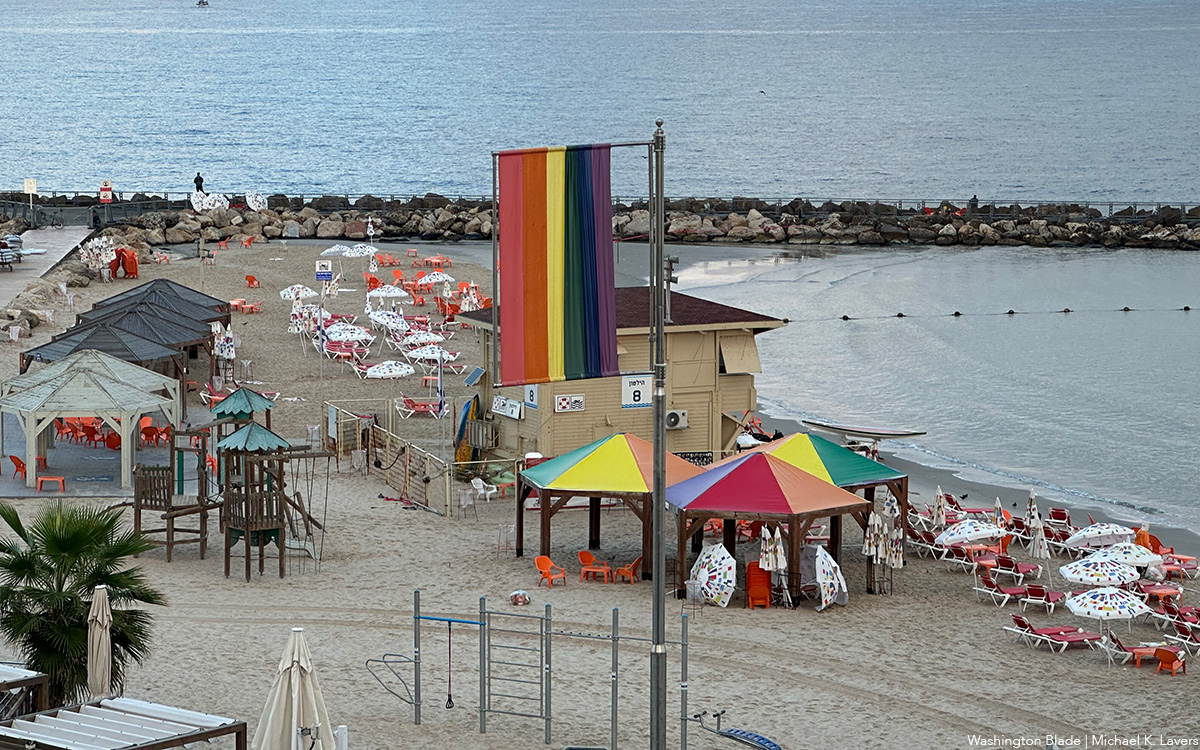
Tel Aviv authorities on Friday cancelled the city’s Pride parade after Israel launched airstrikes against Iran.
The Associated Press notes the Israeli airstrikes targeted nuclear and military facilities in Iran. Reports indicate the airstrikes killed two top nuclear scientists and the leader of Iran’s Revolutionary Guard.
Iran in response to the airstrikes launched more than 100 drones towards Israel. The Israel Defense Forces said it intercepted them.
The Tel Aviv Pride parade had been scheduled to take place on Friday. Caitlyn Jenner was to have been the event’s guest of honor.
Authorities, in consultation with local LGBTQ activists, last year cancelled the Tel Aviv Pride parade out of respect for the hostages who remained in the Gaza Strip after Oct. 7. Jerusalem’s annual Pride parade took place on June 5.
Iran
Underground queer network challenges Iranian regime
Homosexuality remains punishable by death in country

While global powers negotiate with Iran’s regime under Ayatollah Ali Khamenei to curb its advancing nuclear program, the oppressed LGBTQ community is building and operating a secret underground network to resist state-coerced sex reassignment surgeries.
These surgeries, mandated for gay and lesbian people as a state-sanctioned alternative to execution for homosexuality, are part of Iran’s penal code that criminalizes consensual same-sex sexual relations. The network provides safe houses, forged identification documents, and covert communication channels to protect members from government raids and imprisonment.
Precise data on LGBTQ people prosecuted in Iran for resisting state-coerced sex reassignment surgeries over the past decade remains elusive, as the regime’s opaque judicial system obscures such cases under vague charges like “corruption on earth” or “sodomy.” NGOs, including 6Rang, report that thousands of gay and lesbian Iranians face pressure to undergo surgeries to avoid execution for same-sex conduct, with resistance often leading to arrests or harassment for violating gender norms.
Zahra Seddiqi Hamedani and Elham Choubdar, two prominent activists, in 2022 were sentenced to death for their social media advocacy, charged with “corruption” and “human trafficking,” though their convictions were overturned in 2023. Similarly, Rezvaneh Mohammadi in 2019 received a five-year sentence for promoting “homosexual relations,” a charge hinting at resistance to the regime’s heteronormative mandates.
Arsham Parsi in 2003 escalated his clandestine fight for Iran’s LGBTQ community by launching Voice Celebration, a secret Yahoo chat group where 50 queer Iranians, using aliases, exchanged coded messages to evade the regime’s surveillance. Operating like operatives in a shadow network, participants shared text messages about human rights and survival tactics, knowing a single breach could lead to torture or execution. Parsi, then 23, orchestrated the group’s encrypted communications, building a virtual lifeline that connected isolated individuals across the country until his cover was nearly blown, forcing a desperate escape in early 2005.
Parsi in an exchange with the Washington Blade revealed a defiant undercurrent in Iran, a movement too elusive to be called traditional resistance yet pulsing with covert rebellion against the regime.
The state’s relentless push to force gay men into coerced surgeries — marketed as a “solution” to their sexuality — seeks to erase their identities through enforced conformity. Parsi, steering the International Railroad for Queer Refugees, disclosed how queer Iranians fight back with clandestine measures: Underground education to counter state propaganda, discreet psychological support to fortify resilience, and encrypted networks to forge secret alliances. These efforts, veiled to evade regime detection, dismantle the state’s narrative with every hidden signal and guarded connection.
“We are working to create a true grassroots resistance by empowering people to understand their identity, seek safe alternatives, and reclaim their agency despite the oppressive context,” said Parsi. “The Iranian regime’s policies are built on denial of sexual orientation and a forced alignment with a binary gender model.”
“Rather than recognizing gay, lesbian, or bisexual individuals, the system pressures them — particularly gay men — to undergo irreversible surgeries in order to be legally tolerated,” he added. “This systemic violence creates deep psychological harm and compels many to resist, even quietly, to protect their truth. The lack of legal recognition and the threat of arrest, harassment, or blackmail fuels the underground defiance we see today. It’s not only resistance for survival — it’s a rejection of state-imposed identity suppression.”
IRQR, guided by Parsi, for nearly two decades has operated as a lifeline, orchestrating daring escapes and running a covert network for Iran’s hunted queer community.
Parsi said his work relies on secret, encrypted channels — meticulously managed to avoid detection — to funnel at-risk individuals to safety, smuggle life-saving information, secure hidden safe houses, and deliver emotional support. Every operation faces threats not only from the regime’s security forces but also from Basij militia operatives who masquerade as queer individuals to infiltrate networks, heightening the peril for those marked by their identities.
Black-clad Basij militia members respond at the first signs of defiance; tearing through crowds on motorcycles with batons and guns at the ready, poised to crush any challenge to Iran’s regime. These paramilitary volunteers, bound by fierce loyalty to the Islamic Republic, serve as the state’s enforcers, their plainclothes operatives slipping into dissident networks to root out the defiant.
The Basij fill queer Iranians with dread; their so-called morality patrols and digital traps stalking those who dare to exist outside the regime’s rigid norms.
“Their goal is not only to gather intelligence but to undermine, divide, and cancel the work of activists and organizations like ours,” said Parsi. “This divide-and-conquer strategy is designed to break solidarity and generate mistrust.”
“We have seen numerous cases where trusted circles were compromised by these informants, and it has made our work — and survival — even more complex,” he further noted. “Despite this, we persist. Through our underground connections, we have helped thousands of queer Iranians seek safety, community, and ultimately, freedom.”
Parsi told the Blade that international support — through funding, advocacy, policy pressure, or amplifying his stories — can significantly strengthen his work to protect Iran’s persecuted queer community. He emphasized IRQR operates with limited resources, making global solidarity essential to improve outreach, enhance safety measures, and respond swiftly to those in need. Parsi underscored such support brings visibility to the crisis in Iran, reminding those at risk they are not forgotten while exerting pressure on a regime that thrives on silence and fear.
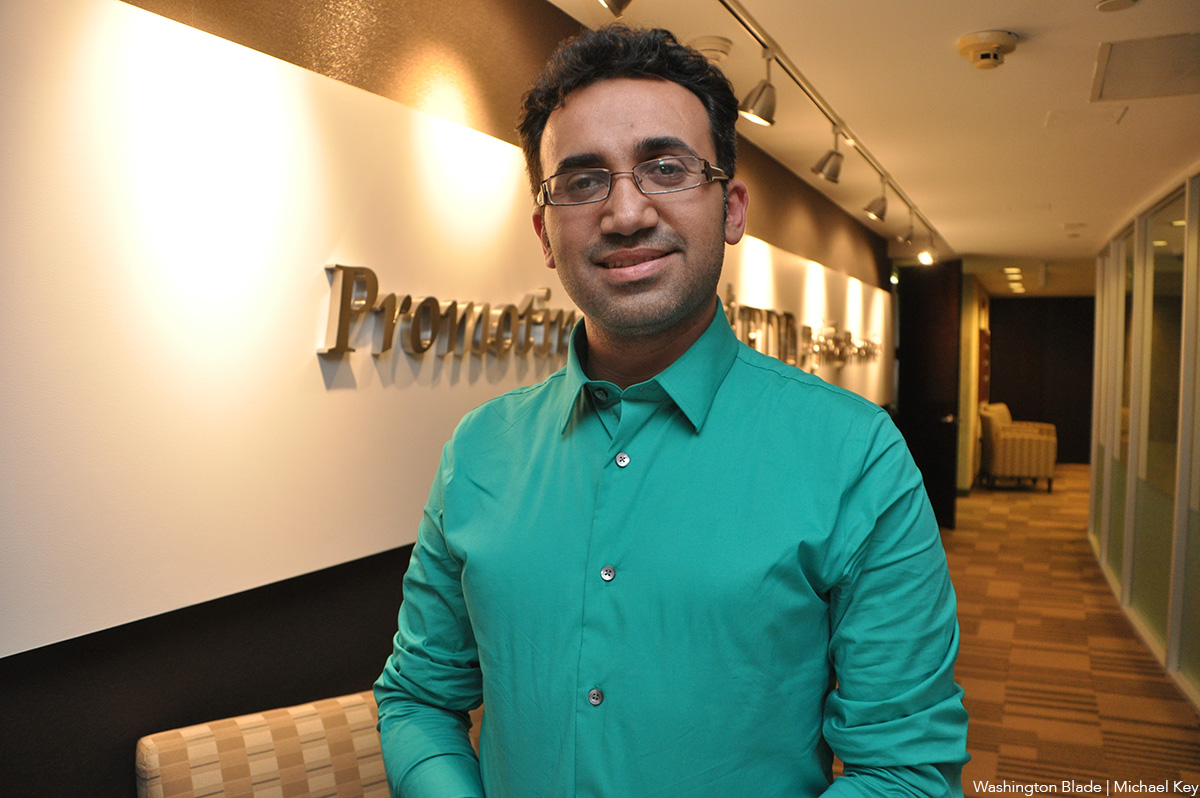
One of the things that Parsi’s underground network offers is online workshops that educate queer Iranians about how they can remain beyond the regime’s reach.
He said these sessions, designed for safety and accessibility, encompass peer support, mental health education, digital security training, and guidance on refugee pathways. Parsi explained the workshops give vulnerable Iranians the tools to navigate persecution, defy state surveillance, and pursue escape, exposing the resilience of a community under relentless scrutiny.
“Due to the high risk of persecution in Iran, traditional protests are not feasible,” said Parsi. “Instead, acts of resistance take quieter forms — like anonymous storytelling which are just as powerful in building awareness and connection within the community. While discreet, these activities help create a sense of solidarity and empowerment among queer Iranians.”
Parsi, undeterred by Iran’s unyielding regime, asserted with measured confidence that while underground acts of defiance — living authentically, supporting one another, resisting forced medicalisation — may not shift policy overnight, they are already improving lives. He stressed these quiet rebellions that queer Iranians stage challenge the regime’s narrative of shame and invisibility, forging a resilient foundation for future change. Each act, Parsi emphasized, dismantles the regime’s grip, offering hope to those navigating a landscape of relentless oppression.
“At IRQR, we view each life saved, each network built, and each truth spoken as a small but powerful act of resistance,” said Parsi. “These are the seeds of future liberation. Over time, as they multiply and gain visibility — locally and internationally — they will help reshape the landscape for queer Iranians.”
ILGA Asia Executive Director Henry Koh said queer Iranians’ underground resistance is a powerful assertion of bodily autonomy and self-determination. He described it as a deeply courageous act in a regime where visibility invites immense personal risk, from arrest to execution.
When asked by the Blade if the Iranian regime’s punitive measures against openly queer people fuel underground resistance, Koh responded unequivocally.
“Absolutely,” he said. “The climate of criminalization and repression leaves little safe space for queer people to live openly. This forces many into secrecy or underground networks as a means of survival, resistance, and mutual support. Such conditions are not only unjust but also profoundly harmful to the well-being of LGBTIQ+ individuals.”
“It is important to distinguish between affirming gender-affirming care and any form of coercive medical intervention,” he added. “When states or authorities mandate medical procedures as a condition for recognition or safety, it constitutes a grave violation of human rights. Gender identity is deeply personal, and no institution should override an individual’s self-defined identity.”
-

 U.S. Supreme Court4 days ago
U.S. Supreme Court4 days agoSupreme Court upholds ACA rule that makes PrEP, other preventative care free
-

 U.S. Supreme Court4 days ago
U.S. Supreme Court4 days agoSupreme Court rules parents must have option to opt children out of LGBTQ-specific lessons
-

 National5 days ago
National5 days agoEvan Wolfson on the 10-year legacy of marriage equality
-

 Congress5 days ago
Congress5 days agoSenate parliamentarian orders removal of gender-affirming care ban from GOP reconciliation bill

